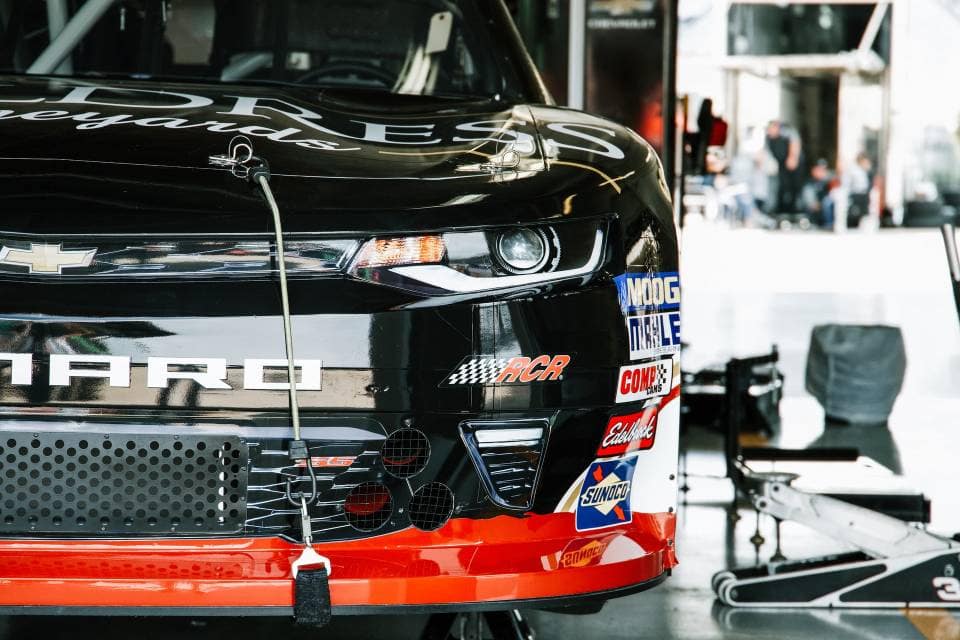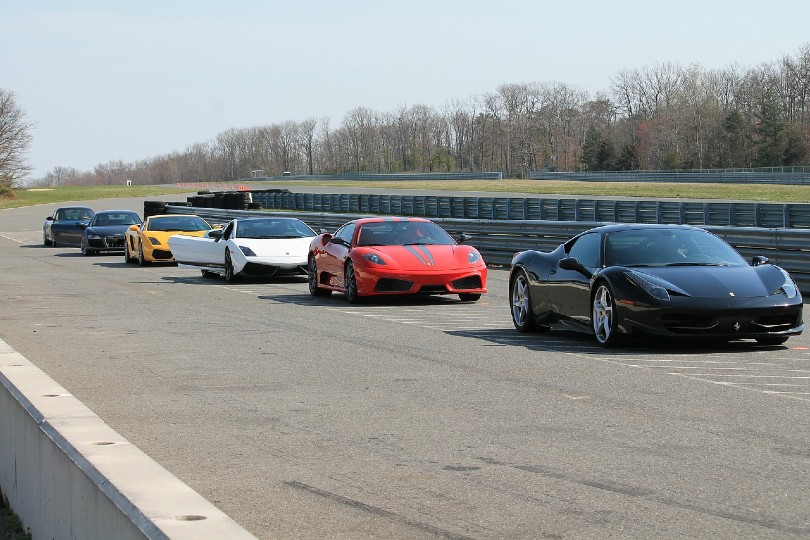How Loud is a NASCAR Race in Decibels (dB)? With Comparison Chart
-
Kristin Hitchcock
- Last updated:

NASCAR races are extremely loud. While the exact decibel rating will vary depending on the track and current weather conditions, most races are around 100 decibels. For reference, speaking normally is about 60 decibels. Standing next to a lawnmower is about 90 decibels.
That is far too loud to talk over and can lead to hearing loss. While 100 dB is a bit too low to start causing hearing damage instantly, anything over 80 decibels can cause hearing damage over time. Most NASCAR races last for a few hours and if you don’t wear hearing protection, you will likely experience hearing loss by the end of the event.
Because races are so loud, NASCAR has proposed adding mufflers onto cars, which would make them quieter. However, this has been met with some shock from old fans. Still, NASCAR is likely considering this move because their fanbase has dissipated in recent years.
Gen X and millennials are less interested in NASCAR than previous generations—and the noise level may have something to do with that! These generations see sporting events as social events, and it is hard to enjoy a social event if it is too hard to talk.
How NASCAR Races Compare to Other Noises
| Noise | Rating (dB) |
| Rocket Launch | 180 |
| Shotgun | 160 |
| Fighter Jet | 150 |
| Fireworks | 145 |
| Rock Band Concert | 130 |
| Chain Saw | 105 |
| NASCAR Race | 100 |
| Welder | 90 |
| Heavy Traffic | 80 |
| Vacuum Cleaner | 70 |
| Normal Conversation | 60 |
| Quiet Office | 50 |
| Whisper | 25 |
| Rustling Leaves | 10 |
Does NASCAR Hurt Your Ears?
NASCAR races are considered “extremely noisy”. They are about 900 times louder than the safe, acceptable level. Therefore, it is very easy for NASCAR races to cause hearing loss, especially since races last a number of hours. Watching a race can easily lead to tinnitus and hearing loss.
Of course, those at the highest risk are drivers, pit crews, and workers. They are exposed to high levels of noise regularly, usually for many weeks in a row.
However, even a one-time spectator is at risk. Many spectators do not bring hearing protection, which puts them at higher risk than the driver themselves. The damage caused by these races is permanent. It does not go away with time and is almost certain to happen if exposed to a NASCAR race without any sort of protection.
Do You Need Earplugs at NASCAR?
Yes. You absolutely need earplugs to go to a NASCAR race. The sound level is much higher than needed to cause damage. Without any sort of protection, you could experience permanent hearing loss and tinnitus. In fact, the odds are quite high that you will.
Some diehard fans are known for proclaiming that they have gotten used to the noise and do not need earplugs. However, this is because they have lost hearing due to exposure! This level of noise is dangerous—not something you “get used to.”
Therefore, it is a minimum to use earplugs at a NASCAR race. Preferably, you want something a bit more protective than earplugs, such as headphones. You can see the noise rating for the headphones on the package when you purchase them. While most can handle 100 dB pretty easily, it is always best to check before you make your purchase.
Those sold at NASCAR tracks are typically able to handle sounds at this level. Most of the time, you can find some at the track for only a few dollars. However, it is always best to bring your own pair just in case.
Do NASCAR Race Drivers Lose Their Hearing?
While NASCAR drivers are outfitted with specially made headphones that are meant to protect their hearing. However, nearly all drivers have some level of hearing loss. After spending so much time around damaging sound levels, it is difficult to get away with perfect hearing.
Furthermore, many drivers are not very safe with their hearing and most drivers have to purchase hearing aids at some point. In fact, noisy conditions are not just a problem at NASCAR—they are a problem at practically all motorsports.
While there are many steps drivers can take to protect their hearing, it only takes a time or two of forgetting to wear hearing protection for hearing loss to occur.

Why Are NASCAR Cars so Loud?
NASCAR cars do not have a muffler, which is one reason why they are so loud. They also have very large engines. Plus, there are simply a lot of cars going very fast at a NASCAR race, so it is expected to be loud.
Because their cars are so loud, NASCAR has considered adding a muffler onto their cars. However, this is expensive, as the exhaust often has to be replaced multiple times a season. Mufflers are expensive, and those used on racing cars would need to be top-of-the-line.
Plus, many fans enjoy the noise element, even if it does harm their hearing. There is a possibility that NASCAR would lose some fans if they diminished the sound level. Still, it would be safer for everyone involved and may increase their younger fan base, who typically do not like the high noise level.
Is NASCAR Making Their Cars Quieter?
While NASCAR has been debating making their cars quieter for some time, the odds of this happening are rather low. It was first mentioned back in 2017 as an attempt to draw in the younger crowd. However, the proposed muffler never got out of testing.
It would seem that NASCAR is too worried about the potential downsides of reducing the noise. Many are concerned that some of the older fanbases may be lost, as many people enjoy the louder sound.
Either way, it doesn’t appear that they plan on lowering the sound level anytime soon. If you head to a NASCAR race, be sure that you wear the proper hearing protection. The sound can easily damage your hearing, especially after a couple of hours.
Conclusion
NASCAR races are extremely loud. They typically measure at around 100 dB, which is enough to damage your hearing after only a couple of minutes. Since races are typically a few hours, we’d expect hearing protection to occur in practically everyone without hearing protection. Therefore, it is vital that you get proper hearing protection before the race.
While most NASCAR races do have hearing protection for sale at the gate, it is always better to stock up before you head to the race – just in case. If you get there and they do not have proper hearing protection, you may have to turn around and head home.
Of course, while fans do often get hearing damage, drivers and the crew are at an even higher risk. Down at the road and inside the cars, the sound level can reach 130 dB. For this reason, most race car drivers do get hearing damage. Many of them need hearing aids when they are older, even if they wear their hearing protection most of the time.
It only takes one occasion to cause hearing damage, and most drivers will forget at least once. 130 dB is enough to cause pain, though, so most drivers don’t forget for very long!
Featured Image Credit: Chase McBride, Unsplash
Contents
